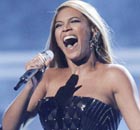Top News
ITTF cheif pushes reform to curb China dominance
By Tang Yue (China Daily)
Updated: 2010-02-02 09:37
 |
Large Medium Small |
Adham Sharara had a bittersweet time in China last month.
The president of the International Table Tennis Federation (ITTF) enjoyed the star-studded exhibtion match in Chengdu and cut the ribbon at the opening ceremony of a table tennis museum in Shanghai.

However, aside from the promotional programs, the president also had to put a positive spin on the ITTF's proposal to reduce entries in the singles events at the 2012 London Olympic Games from three to two players per country.
According to Sharara, only Tony Yue of Hong Kong, who was the representative of Cai Zhenhua, president of the Chinese Table Tennis Association (CTTA), spoke against the proposal.
Meanwhile, Liu Guoliang, head coach of China's national men's team, said the change was "unfair", claiming "players have been working so hard for their Olympic dream and it is cruel to deprive them of their rights overnight".
Sharara said the proposed change had been frequently discussed by the ITTF over the past eight years.
"Following the Beijing Olympic Games the discussions became more serious and, after the Yokohama World Championships, many associations started to push for the change," he said.
At the 2008 Games, Chinese paddlers swept all the singles medals and team championships and consolidated their supremacy at the Worlds last year by collecting 17 of the 20 medals on offer.
The president reiterated he did not believe China's overwhelming strength in the sport was good for the development of the game.
"Yes, of course, that is very true," Sharara told China Daily, via email, when asked if he was worried about China's dominance. "No international federation wants to see only one country dominate its sport."
"But it's not only in the ITTF. The swimming federation (FINA) did not want to see American dominance so it reduced the number of swimmers per country from three to two in individual events. Also, taekwondo does not want to see Koreans dominate, so they have a very strict rule of only one athlete per country per event," he said.
"The change in swimming is, of course, not good for the US, but the US accepted the change to support the International Olympic Committee (IOC). China also supported the change in swimming, so, to be consistent, China should also support the change in table tennis."
Since Sharara took over as president in 1999, the sport's governing body has tried to make the game more competitive by introducing larger, slower balls and also banning "speed glue", an adhesive that increases the elasticity of the paddle. The ITTF also implemented the 11-point, best-of-seven-games system.
"Those moves were very successful and lived up to expectations. Without those reforms our sport may have died a long time ago," Sharara said.
He also hinted there would be more reforms to come but preferred to keep them under wraps for now.
However, coach Liu remains a staunch critic of the ITTF president.
"It was OK for the president to initiate reforms but the direction was not right. The sport's ruling body should keep the rules simple and shouldn't promote the sport by curbing one country," he said.
Sharara said the moves have not been designed to hamper China.
"It is completely wrong to think that any changes were made against China. Unfortunately, it is in the Chinese mentality to think this way. In general when there is a change the Chinese think it is against them," he said. "But the difference is that now in China the mentality is more international and people understand the changes better."












